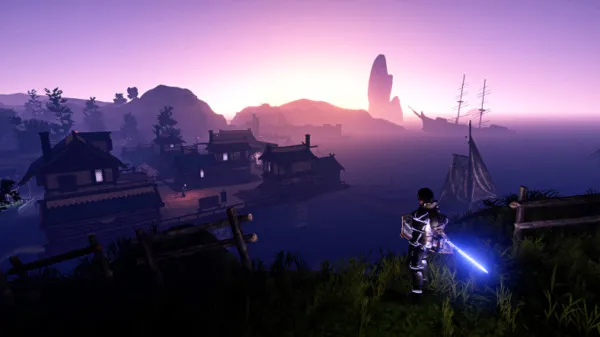Why Outward Is The OpenWorld Gem You Need To Play
A fresh twist on the sprawling open-world genre, boundless replay value and you can’t die!

The open-world role-playing game genre has exploded over the past decade. With gaming juggernauts like Fallout and Elder Scrolls, the appeal is plain to see. Instead of the linear, level-based games of yore, players are free to roam. This is where Outward by developer Nine Dots Studio truly shines.
Instead of being forced down a typical RPG path, complete with convenient barriers which only dissipate when an objective is completed, your character can carve their own path in the world. This freedom is a welcome change from the rigidity of past genres. Players can opt to complete the main story line, any number of side quests, or just explore for hours. That said, the open-world gaming experience isn’t without its faults.
Table of Contents
Need A Helping Hand? Outward Offers None
The open-world scene does have some issues, however. It seems like no matter what title you’re playing, you’re given the same shortcuts for the sake of saving time. Quest markers point towards your objective, you’re fitted with a veritable GPS system in the upper right corner of your screen, and you can instantly travel to any location instead of travelling. While this can be of assistance to the time-constrained gamer, it may also miss the point of the open-world experience: It’s not about the end goal, it’s about the journey to get there.
Outward is what one gets when they envision a brilliant survival game concept after playing weeks of Dark Souls. Instead of playing as your typical hero of destiny, this title throws players into the inhospitable, hostile world of Aurai as, well, your average person.Ravaged by chaos and the appearance of a malevolent force known as the Scourge, your character’s primary goal isn’t to embark on a path of prophecy, but simply to survive. Unlike many other games of its ilk, your character needs food, water, rest and even treatment for disease. There’s no fast travel, no quest markers and no mini-map. And here’s the kicker – you also can’t die.
What’s The Point Of Never Dying?
While it seems like a blessing, or a very faulty game mechanic, immortality comes at a steep price. In Outward, players can’t just save their game and reload it if they fail. The game automatically saves all your character’s progress, and losing all your health just ends up with that character awakening after getting knocked out. Sounds like a good deal, right? Well, it really isn’t. Failing in your journey means that your character has to heal, stock up on supplies, eat and rest. If that character’s contracted any diseases (and they will, trust me) those must be cured, as well. In Outward, all of your supplies must be crafted, as well. Food must be cooked, because raw food will, a lot of the time, produce ailments. Potions for battle and utility must be crafted from foraged ingredients. Your character also must prepare for yet another journey ahead, back to retry their failed quest once more or perhaps to forge a new path. In the age of fast travel, even a walk to the store must be meticulously prepared for.
This Game Doesn’t Sound Very Fun So Far!
Herein lies the beauty of Outward, and it’s a perspective one. Instead of every carefully-guided, breezy quest rewarding players with an achievement at the very end, the entire journey is the achievement. Having to plan and consider so many factors instead of instantly being transported across a continent at the click of a button adds a new layer of depth to this game. Instead of one big victory, Outward is hundreds of small victories, each more rewarding than the next as the player inches closer to accomplishing their goal. Especially considering how there’s no quick-save to reload if failure is imminent. One quest in the world of Aurai bears the complexity of a dozen quests in your standard open-world offering.
Even Magic Comes At A Cost
Even the magic system in Outward requires some serious premeditation. Spell-casting isn’t the standard ‘press X for nuclear air strike’ that your average gamer is used to. Not only do spells require physical components via performing rituals, but they’re most effective when cast in conjunction. In a way, Outward’s magic system has ‘combos’ that one must master in order to succeed in the world. The fun doesn’t just stop there either, would-be wayfarers. In order to play as a Mage, your character has to fight his or her way through a mountain in order to perform a ritual. This ritual unlocks your mana bar and your first spell, but at the cost of some of your health and stamina. The more powerful a magic-user your player becomes, the weaker they become physically. You see, in this game, there really is no such thing as a free lunch. Well, or spell.
Brave The Wilderness With A Friend
There is one very attractive feature of Outward, one that’s quite rare in a single-player role-playing game of the open-world variety. If players find themselves in a serious bind, or just feel like exploring with a friend, they can invite a second player to experience Aurai with them. Cooperative play can either happen online or, curiously enough, in a split-screen setting in person. This offers a new level of enjoyment as you and your friend explore – and suffer – together. One major setback with co-op, however, is the fact that only the game host will progress in quests. Whoever joins in will, sadly, still have to complete their own quests. That said, there’s nothing stopping from two friends from swapping hosts and redoing the same quests.